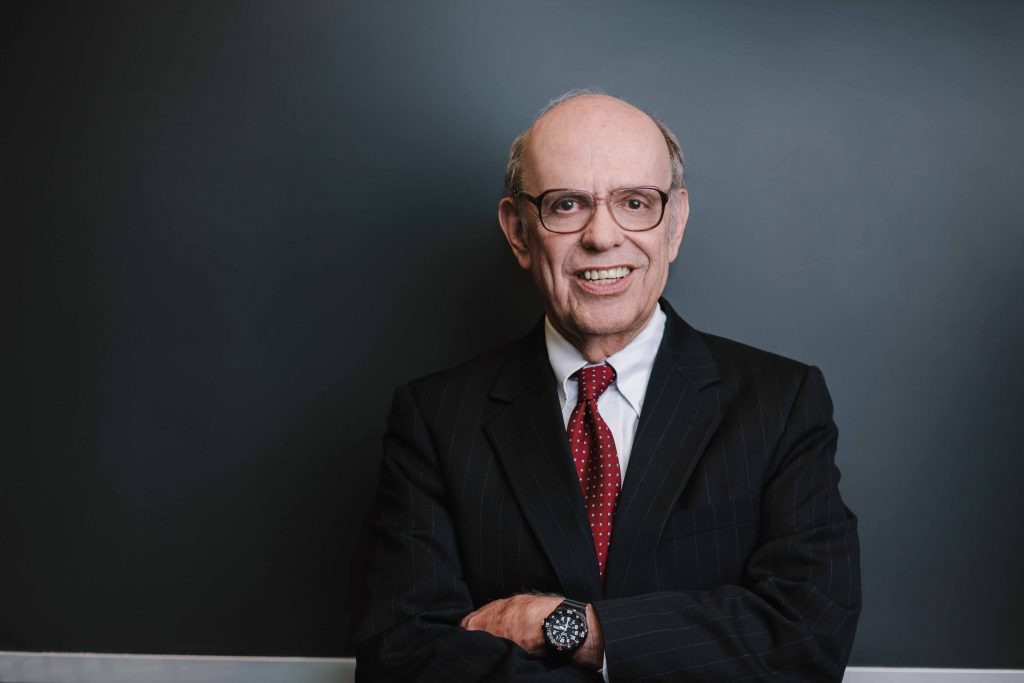In their classic casebook Federal Criminal Law and Its Enforcement, Norman Abrams and Sara Beale call BC Law Professor George D. Brown “a leading advocate of a federal role in prosecuting state and local corruption.”
If anything, these words understate the truth. A faculty member at BC Law since 1971 and chair of the Massachusetts Ethics Commission for four years during the 1990s, Brown has seen 40 of his articles published in nearly as many law reviews and social science journals, and more than a dozen of the most recent ones call for a robust federal role in prosecuting wayward state and local officials.
Such prosecutions raise federalism questions, Brown admits. “There’s a line you have to walk,” he says. “In a perfect world, the states would be leading the prosecutions within their own ranks. I’d like to see the states be the good guys, but they aren’t.” Brown’s writing has been cited more than 500 times in law review articles and court opinions.
In his dissent in Sorich v. US (2009), the late Supreme Court Justice Antonin Scalia cites a Cornell Law Review article in which Brown tries to rescue the “honest services” language in the mail fraud statute from those on the court who find the language vague and are offended by the picture of a federal judge making up rules for state officeholders. In the article, Brown, who shares those concerns, suggests an ingenious workaround: that federal courts use state law to define corruption by state officials. The Fifth Circuit Court of Appeals adopted Brown’s position in 1997, and cited his article as an example of “cogent, scholarly commentary.”
Scalia would have gone much further, preferring to see the honest services language removed from the federal statute book. But a year after Sorich, in Skilling v. US, the court upheld the language, though only as applied to bribery and kickbacks. (Not included were other forms of corruption such as gratuities and extortion.) “I was pleased that the court took a middle ground,” Brown says, “but I thought my middle ground was a better one.”
Brown’s recent writings, taken together, show a Supreme Court that has steadily narrowed its definition of corruption. An early example is the landmark case US v. Sun-Diamond Growers (1999), for which Brown himself helped write the government’s brief. The case took up the question of whether federal law allows an agricultural cooperative to give gifts worth in excess of $5,000 to the secretary of agriculture. A unanimous court, in a ruling some found shocking, decided that the gifts were legal because the government had failed to show that they were linked to any official acts performed or to be performed on behalf of the gift-giver.
Brown’s latest article, in Notre Dame Law Review, touches on a more recent case, Citizens United v. FEC (2010), in which the court ruled on First Amendment grounds that corruption in the electoral sphere is restricted to quid pro quo bribery narrowly defined. Brown says he “can live with” the decision, but he worries that defense lawyers will try to apply it to “ordinary corruption,” where the items of value go to officeholders directly and not to their campaigns, and where no First Amendment concerns apply.
Lawyers for ex-governor Bob McDonnell of Virginia, and those who’ve filed amicus briefs on his behalf, have done exactly that, Brown says. As governor, McDonnell requested and received cash and gifts worth a total of $165,000 from one Jonnie R. Williams, head of a dietary supplement firm. Prosecutors alleged that in return, McDonnell gave his benefactor access to top state officials and allowed him to use the governor’s mansion for a product launch. McDonnell was convicted, and the conviction upheld by a federal appeals court. In January the Supreme Court agreed to hear the case.
“McDonnell’s champions use the word ‘donor,’” Brown complains, “as if [Williams] was a campaign contributor.…To equate [Williams’s gifts] with a campaign contribution is sleight-of-hand.”
Scalia’s death may affect the outcome of McDonnell v. U.S., Brown adds, because the case “raises lots of Scalia’s favorite themes: clear statutes, skepticism of prosecutorial discretion, the criminalization of politics. He would have been very attracted to the argument that McDonnell was providing ordinary constituent services.”
What the governor did in return for the gifts is immaterial, counters Brown. As he points out in the Notre Dame article, “the crime of bribery is complete upon the acceptance of a bribe, regardless of whether or not improper action is thereafter taken.” Thus, the question, he says, “isn’t whether McDonnell performed official acts. It’s whether he agreed implicitly to use his influence at some future point.”
Brown won’t predict how the Supreme Court will rule, but his views will be before the court. His article is cited in two of the amicus briefs filed in the case. Brown does say a McDonnell victory might rouse Congress to enact a law undoing the court’s work, by defining corruption more expansively. “If McDonnell were to win,” says Brown, “and the public understood the extreme generosity that had been showered upon him, I think that would generate some political interest in making a change.”


